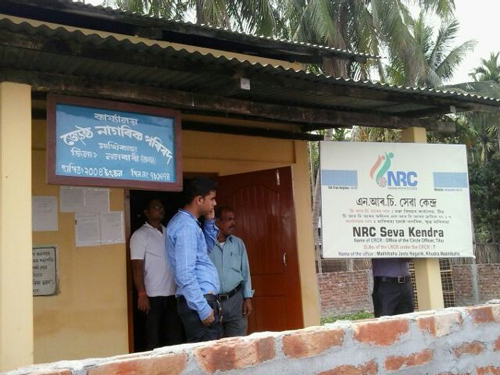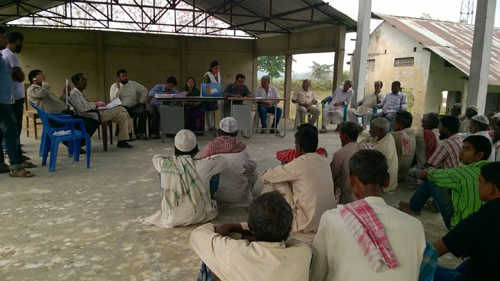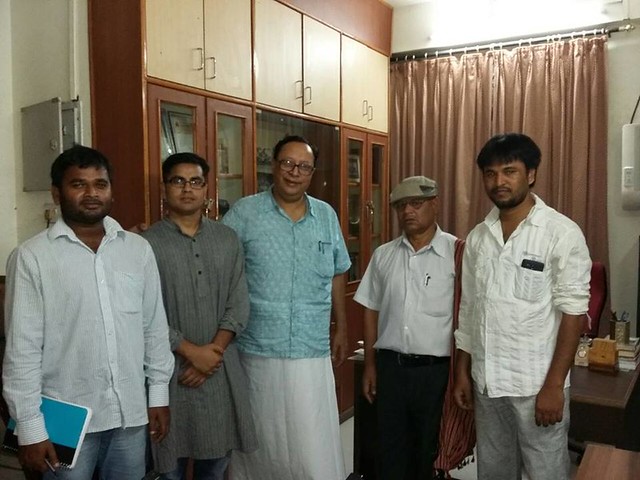By TwoCircles.net Staff Reporter,
Guwahati: Asam Sahitya Sabha’s decision to approach the Supreme Court with a draft proposal regarding the update of National Register of Citizens (NRC) has drawn sharp criticism from various segments.
Dhrubajyoti Borah, Sabha president, had said that if the current procedure is followed a huge section of indigenous people will be left out of the updated NRC.

NRC Seva Kendra
The NRC is a document containing the names of Indian citizens prepared in 1951. Unique to the state of Assam, this document was prepared to distinguish Indian citizens from illegal migrants from then East Pakistan. The 1951 NRC certificate, along with the electoral roll in the voters’ list of 1966 and 1971 are the two important documents required to prove the citizenship in Assam, where propaganda about illegal Bangladeshi is rampant and often violent.
The ongoing NRC update process in Assam will enlist the names of genuine citizens based on NRC 1951 and electoral rolls up to midnight of March 24, 1971. As per Sabha’s draft proposal, people belonging to the scheduled tribes and scheduled castes besides those belonging to OBC and MOBC including the tea tribes, ex-tea tribes and 12 communities of Nepali origin living in Assam, should have automatic entry to the NRC.
“We all are in favour of a correct and authentic NRC but the ongoing method of NRC updating has put many of the state’s original and indigenous communities at a disadvantageous position. Owing to their backwardness and illiteracy, these people are not in possession of any document concerning their Indian citizenship status. Moreover, most of these people are not in the habit of collecting or preserving such documents. The Sabha strongly feels that for these people, the need for legacy data and other documents should be done away and they should be allowed automatic entry into the NRC,” Borah had said.

An awareness camp on NRC
Reacting to this, the Char Chapori Sahitya Parishad (CCSP), another literary body of the state working for promotion of Assamese language in riverine areas, said that this logic is not at all acceptable. “We cannot agree with what the Sabha president has said. How can the Sabha president prove that there is not a single illegal citizens among the SCs, OBCs and MOBCs? His statement is confusing and it will create more trouble than solution,” said Hafiz Ahmed, president of CCSP after a meeting with Borah.
Ahmed said that if this was the condition, there was no need to have an NRC. “It seems the NRC is needed only for the Bengali speaking Muslims. Sabha has given clean chit to all the people in the state except the Bengali Muslims. Such attitude is pretty unfortunate and unexpected from such an institution which was meant to be secular,” he added.
On Friday, a delegation led by Ahmed that included young activist Abdul Kalam Azad, advocate Aman Wadud and journalist Sultan Mahmud Mirdha, met Borah and expressed their views. “Sahitya Sabha prepared a draft proposal on NRC and will approach the Supreme Court based on the proposal. The proposal is deeply partisan and discriminating. The Sabha president is of the view that having legacy data or any other documents would effectively keep a sizeable segment of the state’s original and indigenous population out of the updated NRC. The draft proposal says ‘owing to their backwardness and illiteracy these people are not in possession of any documents concerning their Indian citizenship’. So according to Asam Sahitya Sabha, Brahmins, Sikhs and Marwaris are backward and illiterate,” said Aman Wadud, an advocate and a social activist.

The CCSP delegate with Asam Sahitya Sabha president Dhrubajyoti Borah (centre).
He further said that in the long list of backward, illiterate, original and indigenous communities, Asam Sahitya Sabha did not include Bengal origin Muslims, who have roots in this land for centuries. “Literacy rate of Muslims in Assam is 48 %, Bengal origin Muslims will fare even worse. Around 25 lakh people live in char areas (rive banks), most of them are Muslims, and literacy rate is only 19 %. With these sorts of figure, no community can be called forward except Asam Sahitya Sabha, for whom it seems facts doesn’t matter,” said Aman.
In a bid to make the Sabha understand the importance of Bengal origin Muslims, he continued saying that Bengalis are very conscious about their mother tongue, but they gave up their mother tongue in 1951 to get assimilated with the mainstream Assamese Community or ‘Greater Assamese Nation’.
“During language movement, these neo-Assamese fought against Bengali to get Assamese as official language of Assam. Without such sacrifice Assamese would not have been official language of Assam. Nobody can deny the role of Bengal Origin Muslims during medium movement. Even now, in entire Bengal origin Muslim belt, particularly in lower Assam, there is not a single Bengali Medium school. Everyone goes to Assamese Medium Schools, with rare exceptions to English Medium schools, which have come up recently. Shamelessly, even this doesn’t matter for Asam Sahitya Sabha, whose prime objective is development of Assamese language,” he said.
Following this, the NRC update faced another obstacle as former Assam health and education minister Himanta Biswa Sarma has filed an intervention petition seeking a number of rulings, including a direction to issue NRC to voters who have migrated to Assam from other parts of the country. Sarma has also sought a direction to declare Schedule Tribes (both plains and hills), OBC and SC as the original inhabitants in terms of clause-(g) of the modalities for update of the NRC in Assam for the purpose of inclusion of the names of members of these communities in the NRC.
The All Assam Minorities Students’ Union (AAMSU) has also slammed the Sabha president for trying to ‘misguide’ the people. “This is a political conspiracy to delay the process. AAMSU has always been supporting the cause that there should be a flawless update process and solve the illegal Bangladeshi problem at the earliest. These elements do not want the problem to be solved. When we raised voice for the faults in the process earlier, we were criticized but now they are up to halting the process. We condemn these forces,” AAMSU general secretary Ainuddin Ahmed told TCN.
AAMSU, meanwhile, faced severe criticism when the students’ body tried to stop the update process which was initiated as pilot project in 2010 in Barpeta and Chayygaon. Four AAMSU activists were killed after police fired bullets on the protesters who were demanding to stop the ‘faulty’ process.
Besides, lakhs of the state’s Adivasis, India’s one of the biggest indigenous groups, who were brought from the Chhota Nagpur Plateau by the British to work in tea plantations here in the mid-19th century, are apprehending of being turned into stateless people because of certain provisions in the ongoing updating NRC. They say names of many of their predecessors have neither been enlisted in the NRC of 1951 nor entered in the voters’ lists till 1971, without which they cannot prove their relationship with their forefathers, who were settled in the state about 175 years ago. The population of Adivasis in the state is around 80 lakh.
Related:
‘NRC update must for development of the state’
Barak Valley shuts down over NRC
Efforts and appeal for making NRC update smooth in Assam
Flawless NRC update sought in Assam
Assam students’ body meets Census Registrar General over NRC
